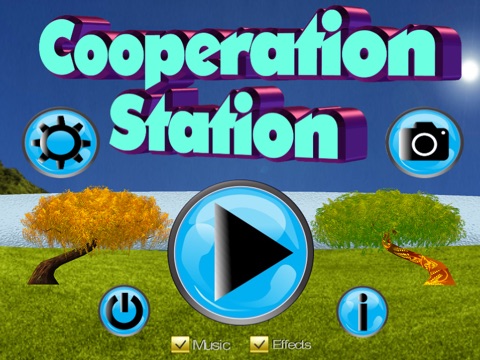
Cooperation Station : Autism Teamwork Trainer
Autism Cooperation Station 1.0!
This game was designed to teach/train and test social motor skills in children of all ages, with a special eye toward children with impaired social abilities. The Cooperation Station mini-games are designed to be intuitive and fun to play, while, at the same time, teaching valuable social skills that will hopefully generalize to real life.
While we suggest a minimum age of 5 or 6, it may be that younger players are capable of using some of the games. As to the maximum age, I have played it with children up to age 18 and had a blast ;)
The newest version of the game allows you to view and collect performance metrics that you or your child can have fun charting over time.
Please send me any feedback of ideas you have to make the games better ([email protected]).
Sincerely,
Roger D. Newman-Norlund, Ph.D.
“CARRY!”
In this game two players must coordinate their actions to carry a bar to a target location. You can make it more difficult by adding obstacles, falling items, or increasing the size of the game board. Once the bar makes it to the target area, you win! This game encourages action synchronization and cooperative goal setting.
“LIFTY!”
This game requires players to work together to lift a bar to the goal area (between the two top blue bars) and hold it there for 2 seconds. The bar will emit mini-stars while in the target area. You can click on different planets (left side of screen) to change the background and difficulty (i.e. larger objects have more gravity and faster ball speed). This game teaches action prediction, complementary action, and joint attention.
“STACKY!”
The Stacking Game requires players to take turns pressing a button in order to stack objects up and get a prize. There are a number of stackable objects that are randomly chosen. If players press their button out of order the size of the stack is reduced. This game teaches turn-taking. Dont be surprised if the learning translates to real-life!
“PONGY!”
Bounce musical notes into the bad guy until he disappears. Catch the power-ups to help your partner, and they will catch them to help you (get bigger, or get more notes to fire). This game teaches children to give to others if they want to receive themselves.
“TAGGY!”
This game requires players to take turns chasing each other around the board. The chaser earns points for tagging the other player. Power-ups can add camoflauge, or speed, or even allow you to walk through the obstacles.
“MAZEY!”
Move the players around to collect faces showing the correct emotion. This game teaches emotion recognition in a fun way.
“BRICKY!”
A version of the classic ‘brick breaker’ game, this two player game involves a lot of cooperation. When players stay close together, they double their points. Dont fight over the power-ups or they disappear!
“TANKY!”
This game has two versions. In the "COINS" version, players control the right and left wheels of the tank respectively and collect coins. In the "BUGS" version, one player controls the tank, and the other controls the turret to get the bugs. Working together is a must in this game, and it may only be playable by advanced cooperators!
General Tips for parents/teachers/clinicians:
• Be creative in how you teach your precious children to work together. As you know, what is obvious to you or I is not necessarily clear to everyone, especially when it comes to basic teamwork and social skills. Be patient, and enjoy playing the games with them.
• If the games are too difficult to be played ‘properly’ make them easier. Here’s an example. The TAGGY! game gives points based on how often one player tags the other. If your child is unhappy because you are outscoring them every time, change the rules so that they win if they get ANY points at all!



